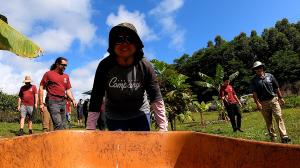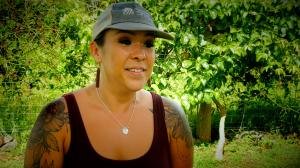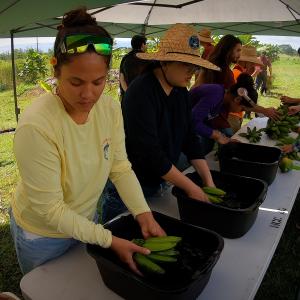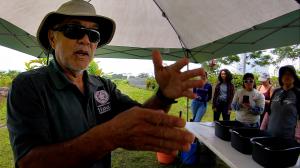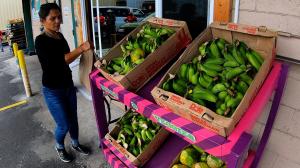Hawaiʻi CC feeds hungry families, grows future farmers
VIDEO NEWS RELEASE
Hawaiʻi Community CollegeLink to video and sound (details below): https://go.hawaii.edu/TmF
***VOSOT script below for consideration***
On a glorious, sunny April morning in Pepeʻekeo on the Hamakua Coast of Hawaiʻi Island, about 15 Hawaiʻi Community College students harvested more than 50 lbs of bananas to feed the community.
They made quick work of chopping down the banana trees and reducing them to mulch, before washing, drying and packing the fruit at the college’s 3-acre farm Mauliola (thriving or healthy) and then loading it into their van for delivery in Hilo.
“It's been actually life changing to have a program in which you're hands-on every single day,” said student Kristen Decoito.
Since 2023, Hawaiʻi CC has donated more than 1,000 lbs of fresh produce from Mauliola to the Hawaiʻi Food Basket.
“Our mission is to end hunger in Hawaiʻi County on Hawaiʻi Island,” said Enola Kaneta, director of operations for Hawaiʻi Food Basket. “Hawaiʻi Community College actually helps us to do that by providing fresh produce and vegetables to our community members.”
Feeding hungry families
In 2021, the college finalized a four-year agreement with landowner Honua Ola Bioenergy to farm and teach agriculture at Mauliola, as long as 90% of the food produced there goes to feed hungry families. The land the college has cleared—armed with weed wackers and lots of sweat equity—stands in stark contrast to the tall grasses and trees surrounding the farm.
“To have a project this big—three acres, 40 ʻulu (breadfruit) trees, maybe 60 banana trees in the ground—is kind of unprecedented for a small program like ours,” said Assistant Professor Lew Nakamura.
Kaneta said, “A lot of our emergency food customers actually come up daily for us and they love to have fresh produce that they can actually then go home and give their families and their keiki.”
Nakamura is excited to be able to train more students who can grow food for the community and teach others to do it, too.
“Where there is hunger, we need farmers. We need people to feed the community, and it's good because we know if it's grown here that it's healthy, that it's sustainable, and we know exactly the source of which it came from,” said Decoito, who will graduate with her associate’s degree in May and plans to pursue a teaching degree.
Theft blunts impact
Nakamura said there will be even more impact next year when the ʻulu starts to ripen. However, recurring agricultural theft is already blunting Mauliola’s impact.
“We've had probably over 300 pounds, or at least 30 bunches of bananas, stolen from us from this parcel,” he said. “Big problem—people taking food away from people who actually need it.”
It’s a problem harming other farmers across the island. Nakamura said he is reaching out to the community to report any agricultural thefts they may witness.
In the meantime, Hawai’i CC will be doing its part to produce the farmers the state needs, such as first year student David Marquis, who proudly posed with a heavy stalk of bananas he had just chopped down with a machete.
Marquis said, “I hope to start a small farm and become food sufficient and help other people too to obtain self sufficiency in food.”
Decoito added, “I just want people to understand that food is a very critical topic here in Hawaiʻi, and without farmers, we're going to have a lot more problems in the future.”
VIDEO:
BROLL: trt: 1:58
:00-1:20 Hawaiʻi CC farm on Hawaiʻi Island
1:21-1:38 delivering bananas at the Food Basket
1:39-1:57 woman puts bananas in bag
SOUND:
Kristen Decoito, Hawaiʻi CC student (:13)
“Where there's hunger, we need farmers, we need people to feed the community, and it's good because we know if it's grown here that it's healthy, that it's sustainable, and we know exactly the source of which it came from.”
Enola Kaneta, Hawaiʻi Food Basket director of operations (:16)
“Our mission is to end hunger on Hawaiʻi County on Hawaiʻi Island, and Hawaiʻi Community College—they actually help us to do that with providing fresh produce and vegetables to our community members.”
Kaneta (:12)
“So a lot of our emergency food customers actually come up daily for us and they love to have fresh produce that they can actually then go home and give their families and their keiki.”
Lew Nakamura, Hawaiʻi CC assistant professor (on the partnership between Hawaiʻi CC, landowner Honua Ola Bioenergy and the Hawaiʻi Food Basket) (:19)
“This public-private partnership was to ensure that the program was able to produce food and get it back into the public domain. Yeah, where there's a lot of hungry families in East Hawaiʻi.”
VOSOT SCRIPT
INTRO:
Hawaiʻi Community College agricultural students are helping to feed hungry families.
VO:
Students grow, process and harvest fresh produce on a three-acre farm called Mauliola on the Hamakua Coast, and have already donated more than 1,000 lbs to the Hawaiʻi Food Basket.
SOT:
Kristen Decoito, Hawaiʻi CC student
“Where there's hunger, we need farmers, we need people to feed the community, and it's good because we know if it's grown here that it's healthy, that it's sustainable, and we know exactly the source of which it came from.”
Enola Kaneta, Hawaiʻi Food Basket director of operations
“Our mission is to end hunger on Hawaiʻi County on Hawaiʻi Island, and Hawaiʻi Community College—they actually help us to do that with providing fresh produce and vegetables to our community members.”
VO:
The project is a partnership between Hawaiʻi Community College, the Hawaiʻi Food Basket and landowner Honua Ola Bioenergy.

